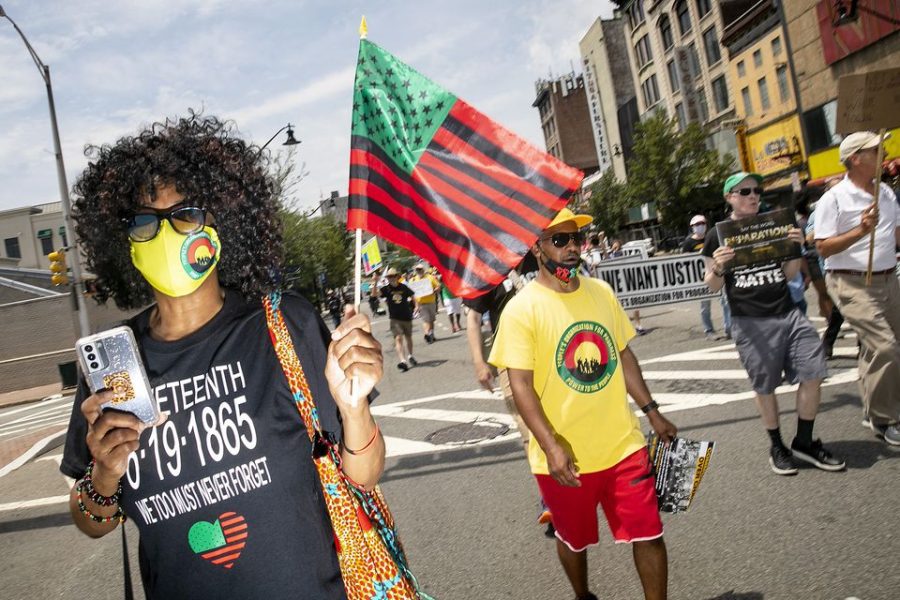Opinion | Expand education on racism this Juneteenth
Photo courtesy of Aristide Economopoulos/TNS
People march as the New Jersey Institute for Social Justice and the People’s Organization for Progress hold a Juneteenth march in Newark, NJ on June 19, 2021. Opinions Editor Aparna Lakkaraju argues that education regarding the holiday should be expanded with many Americans not knowing its significance.
Jun 17, 2022
Exactly one year ago, Juneteenth was declared a legal public holiday by the Juneteenth National Independence Day Act passed through Congress. Though it was only federally recognized recently, Juneteenth is certainly not a new holiday and has been celebrated by Black Americans for over 150 years.
On June 19, 1865, federal troops arrived in Galveston, Texas to demand the last enslaved people in the nation be freed — two and a half years after the signing of the Emancipation Proclamation. Celebrations were held in Texas the following year, and the day has since commemorated the official end of slavery in the United States.
Many lack knowledge of Juneteenth and what it stands for — 42% of respondents in a survey conducted by Gallup know “some” about the holiday, while 40% know “a little bit” to “nothing at all.”
This ignorance regarding such an instrumental event in American history speaks to the limited effectiveness of the American educational system and its teaching of race and racial history in America. In fact, in a study conducted by the Southern Poverty Law Center in 2018, only 8% of high school seniors could correctly identify slavery as the central cause of the Civil War, a concerning viewpoint for the next generation of America.
As if this limited proficiency was not enough, legislators are pushing to further restrict the education of racism and its history in classrooms across the United States. As of February 2022, there have been efforts in 36 states to restrict the teaching of racism and bias in American history.
Get The Daily Illini in your inbox!
Many GOP legislators justify this push for restriction by arguing that learning about racial issues in classrooms invokes discomfort in students. Florida Gov. Ron DeSantis proclaimed that learning about racism would encourage students to “hate our country or to hate each other.”
Also frequently thrown around in this argument is critical race theory, which is a framework that states that racism is inherent in American social institutions such as the criminal justice system, housing market and education system. Critical race theorists posit that racial inequality is a societal problem that stems from America’s founding and structure.
Many of America’s founding fathers were slave owners — it is not a far stretch to believe that the America they built was meant to uphold this imbalance of power.
CRT has become a hot buzzword for GOP legislators. By painting the framework as racist and claiming that the framework designates all white Americans as privileged oppressors, they attempt to incite fear in concerned parents.
Most Americans fall victim to this fearmongering, yet hardly understand CRT. In a study conducted by Northeastern University, 7 out of 10 Americans could not articulate what CRT even was.
Learning about the powers and privileges one holds is crucial to developing empathy and a broader view of the world around us. Choosing to ignore the institutional racism that is embedded in America’s structure helps no one and merely amplifies the issues that disproportionately affect Black Americans.
Learning and acknowledging the systemic racism that has been built into America’s foundation is crucial to fixing these problems from the ground up, and it is up to our generation to push for expanding upon the education on racism and racial bias in the United States this Juneteenth.
Aparna is a sophomore in LAS.






